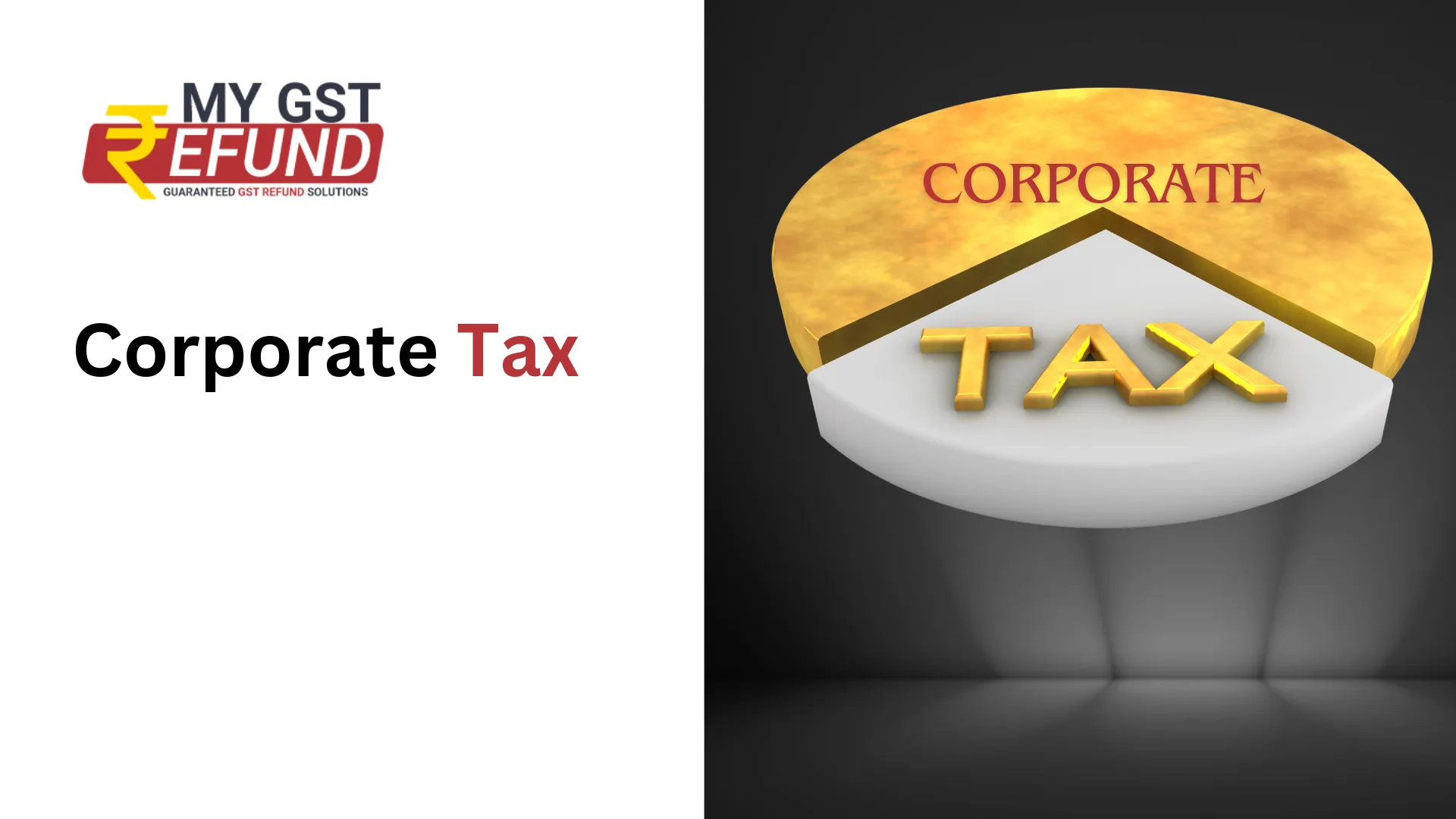Corporate Tax
When a company earns money, it needs to pay taxes on that income, which is known as corporate tax. In India, both local and foreign companies have to pay taxes according to the Income Tax Act of 1961. The tax a company owes is determined by its taxable income, which is calculated by subtracting the expenses for things like goods sold, administrative work, marketing, research, depreciation, and other costs from the total money it makes. Different countries have different corporate tax rates, with some places having very low rates and being called tax havens.
Corporate Tax In India
A corporation is like a separate person in the eyes of the law, distinct from the people who own it. The money a corporation makes is looked at separately from the profits it shares with its owners. According to the Income Tax Act, corporations in India are divided into two groups: local businesses and companies from other countries, to figure out how much tax they need to pay.
Corporate Tax Rates In India
An entity's corporate tax is assessed using a slab rate system that differentiates it based on the type of entity and the income it generates. Below are the corporate tax rates imposed in India:
Corporate Tax Rate Levied on Indian Companies
Companies in India, whether owned by the state or privately, and registered under the Companies Act of 1956, have to pay taxes. Domestic businesses currently face a tax rate of 30%. If a domestic business earns between Rs. 1 crore and Rs. 10 crore in net revenue, it must pay an extra 7% surcharge. For businesses earning over Rs. 10 crores, a 12% surcharge applies. In 2019, the Indian government introduced Section 115BAA through the Taxation (Amendment) Act, which brought changes to the Income Tax Act. One key change is that domestic businesses now have the option to pay taxes at a lower rate of 25.168% under Section 115BAA. Additionally, the Minimum Alternate Tax (MAT) on profits is set at 15% when calculated according to Section 115JB.
Corporate Tax Rate Levied On Foreign Companies
Foreign companies that earn money in India have to pay corporate income tax. Royalties and other fees they earn are taxed at a rate of 50%, while the rest of their income is taxed at 40%. If a foreign company's net income falls between Rs. 1 crore and Rs. 10 crore, they have to pay an extra 2% surcharge. If their net income exceeds Rs. 10 crores, the surcharge goes up to 5%. Additionally, regardless of how much money a company makes, a 4% Health and Education Cess is added to the total tax and surcharge. Also, companies benefiting from Section 115BAA are exempt from paying Minimum Alternate Tax (MAT) under Section 115JB of the Act.
Tax Rebates Available On Corporate Tax In India
Companies can get tax rebates or deductions to reduce their corporate taxes in India.
Here's a list of them:
Corporate entities don't have to pay taxes on the profits they make from selling assets. Sometimes, if a company in India gets dividends from other Indian companies, it can deduct them from its taxes. There are deductions available for companies that export goods or are new in business, depending on certain conditions. If a company faces losses, it can carry them forward for up to 8 years to offset future profits. Special rules apply to venture capital companies and funds. Companies might get deductions if they set up new infrastructure or electricity sources.
Deductions Available On Corporate Tax In India
Normally, companies and professionals can subtract expenses related to their income, but only if the expenses are directly linked to their work and not for personal use or long-term investments.
Depreciation: Assets lose value over time, and the rate at which they do so varies depending on what they are used for. It can be anywhere from 0% to 45%.
Goodwill: The Indian government decided that starting in 2021, the value of a company's reputation or image can't be counted as a depreciable asset for tax purposes.Pre-Business Expenses: People starting a new business can spread out certain expenses over five years for tax purposes.
Interest Expenses: If you borrow money for work, the interest you pay is usually tax-deductible, but there's a limit if you're paying interest to certain related companies.
Corporate Social Responsibility (CSR): Costs related to CSR activities can't usually be deducted, but donations to certain charities might get a closer look.
Actual Payment Expenses: Some expenses, like employee bonuses or payments to banks, are deductible when you actually pay them.Penalties and Fines: Fines you get for breaking the law can't be deducted, but some other types of penalties might be.
Payments to Overseas Subsidiaries: If Indian companies pay for services from foreign companies they own, they can deduct those payments as long as they're not part of buying something big.
Tax Planning Method
A taxable entity uses a variety of techniques to execute tax planning, including:
1-Short-term tax planning : means figuring out ways to pay less taxes for the current or upcoming year. It's usually done at the end of the year to lower the amount of money you have to pay in taxes. Some short-term tax planning tricks include waiting to receive money until the next year, speeding up when you pay for things you can deduct, using tax refunds and deductions, selling off investments that aren't doing well, and buying things that qualify for tax breaks.
2-Long-term tax planning: It is about setting up strategies to meet financial goals over many years. This could be planning for things like passing on your wealth to your family, planning your estate, or preparing for retirement. Long-term tax plans need to fit in with your overall financial goals and take into account how tax laws might change in the future.
3- Permissive tax planning: It involves using tax strategies that are legal but might be seen as aggressive or controversial. These strategies use loopholes in tax laws to pay less in taxes. They include things like moving money around to pay taxes in places where the rates are lower, or taking advantage of tax breaks meant for businesses. While these strategies are allowed, they might get you in trouble with tax authorities and can damage your reputation.
4- Purposive tax planning: It is about using tax laws to not only save money but also to achieve other goals, like helping the community or protecting the environment. It involves making smart decisions about how you invest your money and how you run your business, so you pay less in taxes while still doing good things. These goals could include things like donating to charity, reducing the taxes your heirs will have to pay, or supporting economic growth and sustainability.
Dividend Distribution Tax [DDT]
When a company gives some of its profits to its shareholders, it's called a dividend. In India, the government puts a tax on these dividends, called the Dividend Distribution Tax (DDT). This tax has been around since 1997 and applies to all types of companies in India, whether they're private or public. The tax is a percentage of the dividend that's announced, and it's the responsibility of the company to take out this tax and give it to the government. Right now, the DDT rate in India is 15%, so companies have to pay 15% of any dividends they declare as tax.
As a result, if a company pays out more dividends, it means they'll have to pay more taxes. This tax is seen as kind of unfair because the company's profits already get taxed before they give out dividends to shareholders. At first, shareholders didn't have to pay any tax on the dividends they got.
But in the 2020 Union Budget, the Indian government said they're getting rid of the DDT for shareholders. Instead, shareholders will now have to pay taxes on the dividends they get based on their own income tax rates. The idea behind this change is to make the tax system simpler and easier for companies to deal with .
Minimum Alternative Tax[MMT]
To stop big-profit companies from avoiding taxes, India introduced the Minimum Alternative Tax (MAT) back in 1987. MAT ensures that even if a company claims a lot of tax deductions and exemptions under the Income Tax Act of 1961, it still has to pay some tax. MAT is for all businesses, including foreign ones working in India, but it doesn't apply to charities and infrastructure companies that are exempt from income tax under specific parts of the Income Tax Act.
Conclusion
Corporate tax in India is based on a company's income, with rates varying for domestic and foreign firms. Various deductions and rebates are available to reduce tax burdens. Additionally, the Minimum Alternative Tax (MAT) ensures companies pay taxes even with deductions. The Dividend Distribution Tax (DDT) taxes shareholder dividends but was abolished in 2020 to simplify the tax system.
FAQs
Q.1 Is corporate tax a form of direct tax?
A corporate tax also referred to as a corporation tax or a business tax, is a type of direct tax imposed against the capital or profits of corporations or other similar types of legal organisations.
Q.2 Who is going to be in charge of paying company taxes?
A resident company must pay taxes on its foreign profits as well. Only revenue that is received in India, as well as income that accrues or arises, or is presumed to accrue or arise, in India, is taxed for non-resident corporations.
Q.3 Is it mandatory for businesses to pay MAT in addition to company tax?
Yes. Corporate filers are qualified to make MAT payments in a specific year in accordance with Section 115JB. This is applicable as long as the total amount of income tax due, including the health and education cess and surcharge, is determined in accordance with the Income Tax Act and is less than 15% of the company's book profit.
Q.4 How long is the MAT credit transferable?
After the year in which MAT credit was produced, MAT credit can be carried over for up to 15 assessment years.
Q.5 Has the government offered a tax concession for businesses?
Yes, the government has provided a 15% business tax break that is valid through March 2024.
Related Posts








